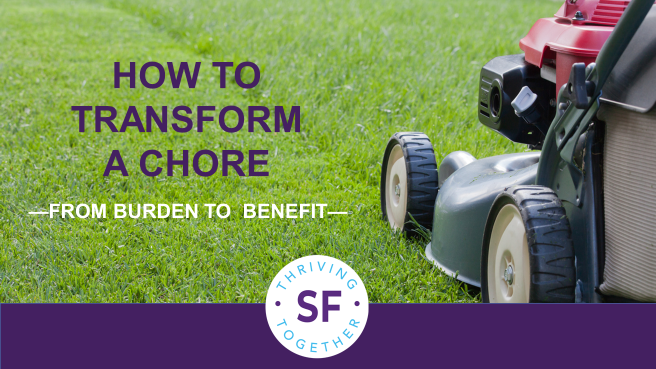Can you think of a household chore, workplace routine or errand on your to-do list that drains your energy just thinking about it? Keep it in mind as you read Mark’s story.
Being on the road constantly for work, Mark found that his motivation for household maintenance bounced back and forth between feeling disinterested and imposed. A big issue was yard work. He just didn’t care about his yard until people started complaining about it — and then he felt guilty for having the shaggiest yard on the block. But the last thing he wanted was to come home from a long road trip to mow the lawn and trim bushes.
Mark felt justified in his lack of yard work and yet got overly defensive when confronted about the issue. One day, Mark’s wife, Siri, asked him, “Why do you enjoy doing the laundry so much?”
As Mark reflected, he realized that he took pride in taking a big basket of dirty clothes and transforming it into a pile of neatly folded garments. He liked taking on a project with a beginning and an end — seeing it through to completion.
Siri suggested that maybe maintaining the lawn could be like doing laundry. Wouldn’t transforming an overgrown yard bring the same satisfaction as the pile of clean clothes? With Siri’s vivid comparison, even Mark could see the connection. He felt himself begin to shift his motivation. He went to Lowe’s and asked one of their experts to show and tell him how to use the best equipment and tools. Now he was gaining momentum — and creating competence.
But the part of Mark’s story that I think is most significant is how he created a connection between the chore he didn’t want to do and what he found most meaningful in his life. According to Mark, what sealed the deal on yard work was reflecting on his values and life purpose — making the connection between doing yard work and his life view toward wellness. Mark has earned multiple black belts in the martial arts, is a certified yoga instructor and has taught fitness for years. What if he could reframe mowing the lawn and trimming hedges into an outdoor workout?
Talk to Mark today, and he expresses authentic enthusiasm for doing yard work because he connects it to how he defines himself in terms of mental and physical health and fitness. Now mowing the lawn isn’t just something he does, but it reflects who he is.
Mark reflected on a chore he enjoyed doing (laundry) and used the insight to bring fresh perspective to a goal he wasn’t optimally motivated to do. Mark had much to gain and little to lose in trying to shift his motivation. His negative energy, guilt and defensiveness had been a burden. His burden wasn’t lifted by eliminating the chore but by creating choice, connection and competence — the foundation for optimal motivation that gives you the positive and sustainable energy to do what you need or want to do.
Three takeaways from Mark’s experience:
- Target a goal, task, or chore that generates negative energy or guilt. If you justify not doing it and get defensive, all the better!
- Reflect on a goal, task, or chore that comes easily, brings you joy and generates positive energy.
- Reconsider the negative chore and ask yourself: “How do I create choice, connection and competence?” For example,
- I could choose to do the chore, pay someone else to do it or not do it and continue to feel guilty and defensive.
- How does the chore connect with my values, purpose and self-identify, or help me contribute to the greater good of people I care about?
- How can I learn and grow from doing or learning to do the chore?
Mark and Siri dropped by a book signing this past week to congratulate me on my new book. But we were really celebrating how mastering their motivation continues to play a factor in their lives. Mark laughed, “Who knew home maintenance would come to this?”
Susan Fowler is on a mission to help you learn the skill of motivation. In her latest book, “Master Your Motivation: Three Scientific Truths for Achieving Your Goals,” she presents an evolutionary idea: Motivation is a skill. Providing real-world examples and empirical evidence, Susan teaches you how to achieve your goals and flourish as you succeed. She is also the author of bylined articles, peer-reviewed research and eight books, including the best-selling “Self Leadership and The One Minute Manager” with Ken Blanchard and “Why Motivating People Doesn’t Work … And What Does: The New Science of Leading, Engaging, and Energizing.” Tens of thousands of people worldwide have learned from her ideas through training programs, such as the Self Leadership and Optimal Motivation product lines. For more information, visit SusanFowler.com.
If you enjoyed this article, sign up for SmartBrief’s free e-mails on leadership and career development, among SmartBrief’s more than 200 industry-focused newsletters.
